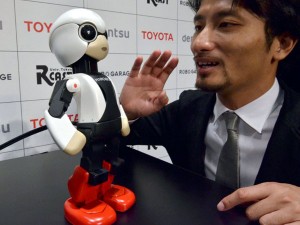Japan launches rocket with supplies, robot to space station

Japan’s Tokyo University robot creator Tomotaka Takahashi demonstrates a humanoid robot Kirobo which reacts to Takahashi’s voice and speaks with gestures in Tokyo on June 26, 2013. A small humanoid robot Kirobo which can talk was sent into space early Sunday, Aug. 4, 2013, to provide conversational company for a Japanese astronaut in the international space station on a six-month mission from this August. AFP
TOKYO—Japan launched a cargo-carrying rocket Sunday loaded with supplies for the crew of the International Space Station, along with a small robot meant as a companion for one of the country’s astronauts.
The H-2B rocket blasted off from the southern island of Tanegashima at 4:48 a.m. local time (1948 GMT Saturday), images broadcast by the Japan Aerospace Exploration Agency (JAXA) showed.
According to JAXA the launch had gone to plan.
“The HTV4 module has separated from the rocket as scheduled and continues its journey to the ISS,” a JAXA spokesperson said during the broadcast streamed over the internet.
“Information on its progress will be given later as and when.”
The unmanned rocket carried a cargo transporter filled with drinking water, food, clothing and work supplies for the six permanent ISS crew.
Talking robot as chatting companion
The annual mission, which has previously been completed by countries including the United States and Russia, will also pick up waste from the space center.
A small talking robot was accompanying Sunday’s mission. The android is designed to act as a chatting companion for astronaut Koichi Wakata, who is set to arrive at the space station later this year.
Standing at just 34 centimeters (13.4 inches) tall and weighing about one kilogram (2.2 pounds), Kirobo is programmed to communicate in Japanese and keep records of its conversations with Wakata, who is the first Japanese astronaut to command the ISS.
“Kirobo will remember Mr. Wakata’s face so it can recognize him when they reunite up in space,” its creator Tomotaka Takahashi told AFP in June.
“He will be the first robot to visit the space station.”
The robot, which has a wide range of physical motion, will also play a role in some missions, relaying messages from the control room to the astronaut.
Sending the android to space is part of a study aimed at seeing how a non-human companion can provide emotional support for people isolated over long periods.
Back on earth, twin robot Mirata will be on the lookout for any problems encountered by its electronic counterpart, which was inspired by the legendary animation character Astro Boy.
In January, Japan launched two satellites from Tanegashima to strengthen its surveillance capabilities, including keeping a close eye on North Korea after it vowed to launch another nuclear test.
One of them was a radar-equipped unit to complete a system of surveillance satellites that would allow Tokyo to monitor any place in the world at least once a day.
The other was a demonstration satellite to collect data for research and development.